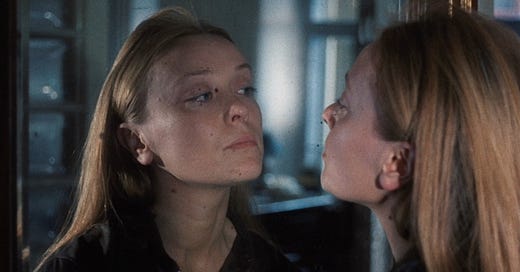Recently, I endured a showing of “Mirror,” the 1975 film by Andrei Tarkovsky. The film is a depiction of one man’s life seen through the images of his memories as he lies in bed about to die.
The non-linear structure of the film is baffling: The jumps between memories of the dying man’s childhood and adulthood are stitched together without an element of coherence. Ultimately, it’s a depiction of a fragmentation of a unified self-narrative.
I spent the entire film utterly confused about what I was watching, but by the final twenty minutes or so, I was in emotional distress begging for the film to end.
I left the theater in tears and felt genuine grief on the train ride home. I don’t totally understand what happened to me as I watched that film, but I am impressed by the strength of the reaction it elicited in me.
As Tarkovsky explains in his book, “Sculpting In Time,” the emotional impact is the point.
“I had the greatest difficulty in explaining to people that there is no hidden, coded meaning in the film, nothing beyond the desire to tell the truth,” Tarkovsky wrote. “Often my assurances provoked incredulity and even disappointment. Some people evidently wanted more: they needed arcane symbols, secret meanings. They were not accustomed to the poetics of the cinema image.”
“Mirror,” though mind-melding, portrayed for me a concept that has grown increasingly important to me. Tarkovsky chose to depict the interconnected events of this man’s life without a tidy, chronological narrative.
We see that he married a woman who was just like his mother (the two are even played by the same actress). We see the trauma of moving from Moscow to the countryside due to war. The character clearly reflects on his own broken marriage that mirrors (ahem) his father’s absence in his childhood.
It is the depiction of memories and formative moments, broken into a collection of events rather than a unified story of this man’s life. It wouldn’t be too difficult for these fragments to be pulled together into a neat and obvious (and very Freudian) story of how one man became himself.
But the disjointedness of narrative, which the viewer experiences as disorienting, is what makes the film so effective. A tragic story about a young man in Russia who grows up to repeat his parents’ mistakes has many opportunities to be an impactful film. But Tarkovsky doesn’t let the devastation of this man’s life develop in time. He blasts you with the complexity inherent to any individual life.
Processing my experience of watching “Mirror” led me to an impassioned essay by the philosopher Simon Critchley. He argues against the experience of self as static and asks his audience to disrupt their reliance on linear thought.
“What is the connection between the development of a sense of the self and a narrative of the self,” Critchley writes. “How does the question of who you are or who I am become a question of storytelling? Is the self a story?”
“Mirror,” along with Critchley’s essay, challenged in me something that I have been working diligently to change about myself. The notion that my life has one singular story, one chain of events that explain the A to B to C of myself has become greatly concerning to me. If I tell myself (and others) one story about myself over and over, the nuances that have profoundly shaped me get lost to time. Further, it becomes increasingly difficult to recontextualize experiences and opinions I’ve allowed to become calcified.
The mind loves a well-worn neural pathway. The connections between events and emotions in our lives get carved into mental troughs that become mental valleys that can eventually become mental canyons. The more I tell myself one narrative about myself, the more difficult it is to scale the walls to escape it.
“The self is not a stream,” Critchley writes. “It is less a seamless flow than a series of jumps and starts that flicker into intense alertness before sliding back into inactivity or boredom. It is a discontinuous series of episodes, an amalgam of blips, pauses, stalls and restarts.”
This concept of a unified self, a singular narrative about who I am (or who anyone else in my life is, really) has started to make me feel claustrophobic. A simplistic story about oneself is an act of self-protection from those unpredictable blips, pauses, stalls, and restarts, but I no longer feel safe being trapped in a rigid sense of self.
In time, I realized the adamant belief I had about “knowing who I am” was locking me out from trying and believing new things. Seeking out new experiences became an essential part of my life. Watching a nearly incomprehensible film by a Soviet auteur is certainly one of them.
“A discontinuous self forces us to live in the here and now rather than in the retold past and imagined future,” Critchley says. “We might even have the feeling that the self is constantly just beginning.”
In “Mirror,” the protagonist’s self is not just beginning. In fact, it is ending. But the retelling of his past is presented in a discontinuous manner. He sees his actions and experiences from a new perspective: One in which he can’t do anything to rectify his past or reprocess his own pain.
Yet the act of making “Mirror” allowed Tarkovsky to experience what his central character could not.
“When I finished making “Mirror,” childhood memories which for years had given me no peace suddenly vanished,” he writes. “As if they had melted away, and at last I stopped dreaming about the house where I had lived so many years before.”
This is, I expect, what elicited my strong emotional reaction to the film. Something in me is screaming to be released from narrative unity and the pain embedded in that worn-out story. I’m tired of feeling like the curator of myself. I’d rather have access to the full collection.
Tarkovsky tricked me into experiencing the depth of feeling that comes from consuming complexity rather than convenience. After coming down from the emotional barrage of “Mirror,” I found that the person left reflecting on the structure of their life story was me.
Special thanks to Andrei Tarkovsky for writing his book about his work and his processes so that there would be fewer questions about his visions and intent upon his passing. Not every artist is so open to explaining themselves, but it sure helped me out this time. Another thanks goes to Simon Critchley, who told me over email that he has not written at length about Tarkovsky, but that he is a fan of “Mirror.”







The thought of mental narratives becoming a confinement is equally soothing & scary. One of the best things I’ve read it a long time. Thank you!
This shook something loose in my brain that I suspect I have been grappling with for quite a while.